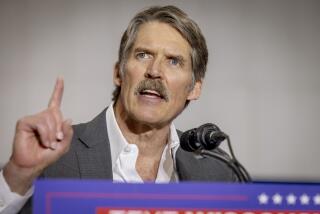Feinstein Still Agonizing Over Health Care Vote
As Sen. Dianne Feinstein (D-Calif.) flipped through the five slim folders on her lap, her characteristic composure gave way to exasperation.
“You try to figure it out!” she exclaimed during an interview in her office late last week. “Here’s the Mainstream Plan; that’s the way it comes. Here’s Moynihan. Here’s all I have from the Finance Committee. Here’s Dole.”
Each file contained a few pages summarizing one of the major alternatives that will be considered by the Senate when it begins its health care reform debate this week or next. The summaries offered few details, no explanation of the trade-offs involved, and, more important, no reliable estimates of what they would cost.
“Until yesterday, I didn’t have all the plans, even,” she added. “You mean, we’re going to pass something and not know what the long-term costs or obligations are?”
In a matter of days, Feinstein will be asked to cast the most important vote of her Senate career: an overhaul of the nation’s health care system that could be the biggest piece of social legislation since the Great Depression.
And as important as this decision is to her, it is no less so to President Clinton. This will be a battle where every vote counts, and Feinstein’s, once thought secure, is increasingly in question.
The issue has preoccupied Congress for almost a year. Four committees produced their own versions of the bill, while a fifth gave up entirely. From these alternatives, the leaders of both houses are fashioning the legislation that they will take to their respective chambers.
For all the attention health reform has received, the vast majority in Congress are legislators such as Feinstein, who do not sit on the committees of jurisdiction and therefore have not had to stake out a firm position. They also have not been privy to the countless hours of hearings and debate that have taken place within the committees.
With little hard information to go on, Feinstein said she is wary both of the Clinton approach and Congress’ hurry to pass a bill before the fall elections.
The Clinton Administration is “quite genuinely trying to do something that’s good for the nation. The question is, what sounds good today can be a lemon 10 years later,” she said. “In my opinion, the rush is a mistake, and I don’t understand it.”
Originally a co-sponsor of the massive health bill that President Clinton presented to Congress last fall, Feinstein quietly removed her name from the legislation in late May.
“It wasn’t a big deal,” she said. “I just wanted the freedom to be able to look at other things.”
Nonetheless, her possible defection set off alarm bells at the White House and among Senate leaders. Feinstein’s was one of the votes they had counted on in what promises to be a closely fought battle on the Senate floor. Now no one, especially the senator herself, seems sure of what she will do.
But what Feinstein sees as a measure of caution, some Democrats say is a lack of political courage. “She’s terrified, scared of her own shadow,” said one senior Democratic aide.
The pressure is mounting. On Friday, Feinstein was summoned to the White House to meet privately with Clinton. First Lady Hillary Rodham Clinton also has indicated that she would like a one-on-one chat with the senior senator from California.
Her California colleague, Democratic Sen. Barbara Boxer, is firmly in the President’s camp. While she would like to see some additional relief for small business and more attention to concerns that are particularly California’s--such as the medical treatment of illegal immigrants--Boxer said she has no doubt that the time for decision has arrived.
“The thing the Congress likes to do more than anything is nothing,” Boxer said. “This is the moment, and we should act.”
Rep. Michael Huffington (R-Santa Barbara), who is challenging Feinstein’s bid for reelection, has ridiculed her shift on the Clinton plan, noting pointedly that it came as her once-commanding lead in the race was collapsing.
“She’s a political animal,” Huffington said. “Right now, anything she does is looked at as being campaign-oriented.”
And although Huffington said he has yet to see a health plan he can support, he contended that Feinstein’s agonizing is just for show. “I still think she’s for the Clinton plan, frankly.”
In her rhetoric at least, Feinstein sounds less like Clinton than his chief foe, Senate Minority Leader Bob Dole (R-Kan.).
Dole, for instance, would agree with this idea: “I’m one who believes we need to take this incrementally, if possible.” Or: “One of the things bankrupting the country is entitlements. This is another huge entitlement.”
Universal coverage, Feinstein said, sounds good as a goal, but is probably one the nation cannot afford, particularly if it means everyone having the generous package of benefits envisioned under the Clinton bill.
She is skeptical too that Clinton’s proposed price caps on health insurance premiums will actually succeed in holding down costs. And she described his bill’s requirement that employers pay 80% of their workers’ health insurance premiums--its primary means of reaching universal coverage--as “a Big Brother mandate.”
Although she has not ruled out supporting some sort of employer mandate, Feinstein said she takes seriously the dire projections that Clinton’s version could cost California as many as 500,000 jobs.
In a fat binder, Feinstein keeps the individual complaints of California companies: a water-conditioning firm in Fullerton that contends the mandate would drive it out of business; a Buick dealer in Torrance warning that its health costs would rise by 41%; the San Diego Restaurant Assn., which says that its members could not support any mandate.
“The point is, in California, with an economy just emerging from a major, major recession, an 80-20 employer mandate, with the huge number of small businesses we have in the state struggling to stay alive, isn’t going to fly with this senator,” she said.
Boxer, on the other hand, insists that studies show any jobs lost in one segment of the state’s economy will be made up in another.
The Clinton plan is more popular in California than in many other states. Its main elements have won the support of the California Medical Assn. And a far more radical measure--an initiative calling for a “single payer” system under which the government would foot the bill for health care--will be on the November ballot.
With an estimated 6 million of its residents now uninsured, California by some measures has more to gain than any other state from universal health coverage.
More to Read
Get the L.A. Times Politics newsletter
Deeply reported insights into legislation, politics and policy from Sacramento, Washington and beyond. In your inbox three times per week.
You may occasionally receive promotional content from the Los Angeles Times.






